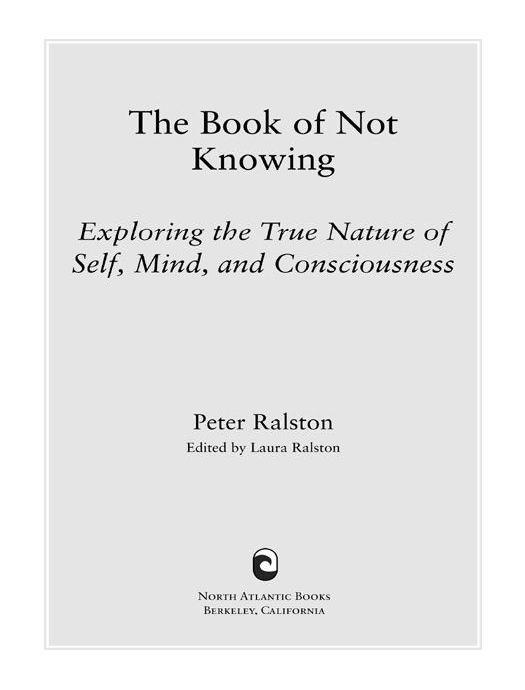The Book of Not Knowing: Exploring the True Nature of Self, Mind, and Consciousness by Ralston Peter

Author:Ralston, Peter [Ralston, Peter]
Language: eng
Format: epub, mobi, pdf
Publisher: North Atlantic Books
Published: 2010-08-30T22:00:00+00:00
What Is “For-Itself”?
16:16 If everything is assessed by us in terms of its value and meaning, then what use do we have for something known only for itself? Without any significance attached, what good does it do us to have such a perception? None. “Is the thing dangerous? Is it useful?” We don’t know. “Then let’s move on.” Our tendency is to overlook what is unknown or is without meaning and value. The only reason we would even attempt to perceive something for-itself is as an exercise, or through placing value on “knowing the truth of things as they are,” or any such reason that would make our efforts seem worthwhile. Otherwise, we would never consider trying to perceive anything for-itself—including ourselves.
16:17 Knowing something for-itself without any secondary considerations—such as use, value, meaning, how we feel about it, what we believe about it, or any other “application”—is essential for openly experiencing what’s there. To experience self for-itself, what we actually “are” must be experienced in its pure form, directly, as it is, regardless of what we believe, think, or feel about it, and free of any other conceptual activity that we could possibly pile on. This places real self in what appears to be a rather useless, meaningless, valueless category. Being the object of much sincere spiritual seeking, the “real self” or “true self” is assumed to be of ultimate value. If it is indeed actually meaningless, we can see how easily it could go unnoticed.
16:18 Perceiving something for-itself requires eliminating everything in our perceptive-experience that is there “for-me”—all judgment, charge, reaction, preference, use, value, name, and so on. This leaves us with a very immediate perception that something is there, but it is without meaning. We are not relating its presence to the self; instead, it is seen as how it relates to itself. Experiencing things for-themselves is not easy, but it is possible. In such a case, a tree then becomes “that thing” which isn’t named “a tree” but is a presence that is experienced as there for-itself. When you get down to the most honest perception of the thing-itself (without any of the automatic self-references mentioned above) this is an experience of something “for-itself.”
Download
The Book of Not Knowing: Exploring the True Nature of Self, Mind, and Consciousness by Ralston Peter.mobi
The Book of Not Knowing: Exploring the True Nature of Self, Mind, and Consciousness by Ralston Peter.pdf
This site does not store any files on its server. We only index and link to content provided by other sites. Please contact the content providers to delete copyright contents if any and email us, we'll remove relevant links or contents immediately.
Becoming Supernatural by Dr. Joe Dispenza(8201)
Crystal Healing for Women by Mariah K. Lyons(7928)
The Witchcraft of Salem Village by Shirley Jackson(7257)
Inner Engineering: A Yogi's Guide to Joy by Sadhguru(6785)
The Four Agreements by Don Miguel Ruiz(6745)
The Power of Now: A Guide to Spiritual Enlightenment by Eckhart Tolle(5757)
Secrets of Antigravity Propulsion: Tesla, UFOs, and Classified Aerospace Technology by Ph.D. Paul A. Laviolette(5367)
The Wisdom of Sundays by Oprah Winfrey(5153)
Room 212 by Kate Stewart(5105)
Pale Blue Dot by Carl Sagan(4996)
Fear by Osho(4727)
The David Icke Guide to the Global Conspiracy (and how to end it) by David Icke(4709)
Animal Frequency by Melissa Alvarez(4462)
Rising Strong by Brene Brown(4451)
How to Change Your Mind by Michael Pollan(4355)
Sigil Witchery by Laura Tempest Zakroff(4238)
Man and His Symbols by Carl Gustav Jung(4131)
The Art of Happiness by The Dalai Lama(4125)
Real Magic by Dean Radin PhD(4121)
